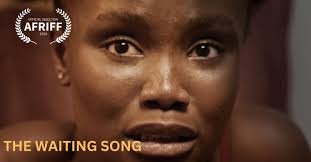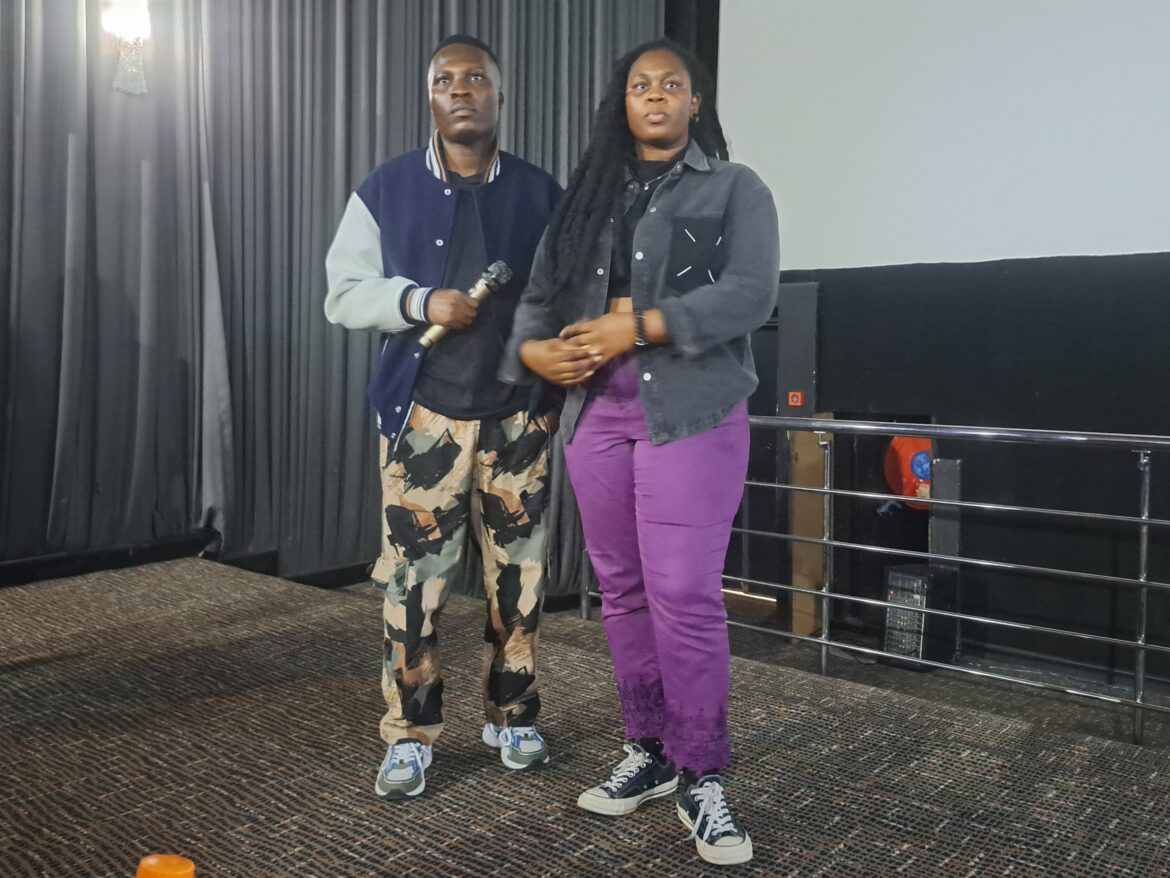At this year’s African International Film Festival – AFRIFF, two rising filmmakers, Nengi Diri and Russell Oru, took the audiences on a different journey with their film, The Waiting Song. Their story was not the typical Nollywood plot but was an attempt to depict what happens between life and death.
This project is intensely personal for Diri, the film’s producer, and Russell, its director. The Benchmark met them at the festival to discuss their creative process and inspirations behind Nigerian storytelling.
Their movie, ‘The Waiting Song,’ was streamed at AFRIFF 2024. It starts with Echioma, a Commercial Sex Worker facing a tough life who suddenly decides to turn things around.
“She’s a prostitute who, in the middle of a sexual encounter with a client, has a change of heart,” Russell explains.
But things go wrong when that decision nearly costs her life. In the strange space between life and death, Echioma looks back at her life choices, questioning her paths and wondering if things could have turned out differently.
Russell says the film’s concept came from his struggles with depression.
“He was going through a rough time, wondering what life was really about,” the film’s producer, Diri, says.
One of the film’s unique approaches is its use of the Igbo language, especially during Echioma’s near-death journey, where she encounters her ‘Chi’. Russell and Diri chose Igbo because the idea of ‘Chi’- a person’s spiritual guide—is an essential aspect of Igbo mythology.
“Even though neither of us is Igbo, making the film in that language felt right. The idea of Chi connects deeply to Achioma’s story.” Diri shares.
The duo took their commitment to authenticity seriously, hiring a professional Igbo writer and a dialogue coach to help with the translation and voiceovers.
Making The Waiting Song took time and effort. It took three years from start to finish. The idea sparked during the pandemic, and the story took shape after seven drafts and input from professionals. The short film has already premiered at several international festivals. The two Filmmakers see AFRIFF as a vast opportunity that validates their art.
“In Nigeria, artistic films aren’t always received well by the general audience. Film festivals are where we can showcase a story like this in front of people who truly appreciate it.” – Diri explains.
The producers are not worried about reaching everyone with their film; they just want to connect with the right audience. They believe it’s about finding those people who ‘get it,’ and Film Festivals help them find their tribe.
Looking forward, Diri and Russell are passionate about seeing more personal stories in Nigerian cinema.
“We want more films about our history, like the Nigerian Civil War or the Aba Women’s Riots,” Russell says.
For him, the future of Nollywood lies in real and personal stories.

Their next project, ‘Doughnut Boy’, is already underway. They describe it as a love letter to Lagos and a story about mental health, which they believe will make waves as one of the best Nollywood movies in 2025.
Diri and Russell, who graduated from Rivers State University and Niger Delta University (NDU), Bayelsa State, respectively, have built a creative partnership that has also grown into friendship through their projects together.
Although they didn’t go to film school, they dove into studying the works of established directors they admire. They both believe that the best film education is watching and learning from the greatest filmmakers.
For these two, AFRIFF is not just a festival but a chance to celebrate their hard work and connect with like-minded people.
A Fireside chat with Nengi Diri and Russell Oru on ‘The Waiting Song’ at AFRIFF.
This fireside chat was conducted by Ishioma Imokhai-Bello, publisher of The Benchmark, on the sidelines of the Africa International Film Festival (AFRIFF) after its premiere at The Palms, Lekki, Lagos.
The Benchmark: Kindly introduce yourself.
I’m Nengi Diri, Producer of The Waiting Song, and this is my colleague Russell Oru, director.
What is the story about?
Russel: So the waiting song is about Echioma, a prostitute who has a change of heart in the middle of having sex with a client. And then, in the process, the client nearly kills her by drowning.
The film is about what happens between death and the afterlife. For example, she has a near-death experience, which is what the entire movie is about. In the near-death experience, she visits the past and begins to question some of the decisions and choices that she has made. It’s a philosophical film.
Diri: So Russell conceived this idea when he was going through a depressive moment in his life. He was wondering what was there to live or what more was there to live. And I know a lot of us have wondered that, too. In short, we wonder about that daily, especially when we’re too stressed. And it’s like, what else is there? It just feels like we’re going around in circles. We’re just waiting to die at the end of the day.
So that’s precisely why the title is THE WAITING SONG.
Why the Igbo Language?
In the film, when Echioma is between life and death, she goes on a journey where she has a conversation with this being that we never really see but hear. That being represents her ‘Chi’, which the Igbos believe in. And that’s exactly why we chose the Igbo Language to do this film—it just works together.
Are you both Igbos?
No, we are not.
So, how did you transcribe your scripts to the Igbo language?
We hired a professional Igbo writer to help with the interpretation. We also hired a dialogue coach to work on the voiceovers for the film because most of the dialogue in the film is voiceovers.
How did you get selected to premiere your movie here? What were the criteria?
We submitted it on Film Freeway and were selected. But this is not the first film festival that we will be premiering. Recently, we filmed at the London Pan-African Film Festival. We’ve also screened at the Rwanda Mashari Film Festival and the Norwich City Realtime International Film (RTF) Festival. We were also finalists at Canes. So this is the eighth film festival where the waiting song will be screened.
How does AFRIFF impact your movie career?
Oru: In a country like Nigeria, where the mass market isn’t tailored to artistic films, film festivals are an excellent opportunity to show artistic films because there, you find the right audience to watch them.
Suppose you make this kind of film into a feature film. In that case, there’s no guarantee that Nigerians would appreciate it, like it or want to see it because it’s very philosophical.
Diri: Just like you said, it’s very artsy for film festivals. People attending film festivals come to see artsy stuff, and once you can get in front of those people, you’ve mined the right market for your films.
Right now, a couple of new people know our names, and that’s more than enough because we’re not trying to get everybody interested in what we make. We’re trying to get the right people interested in what we make. And at film festivals, you find the right people.
What is your takeaway from AFRIFF?
Oru: ARIFF is the biggest film festival in Africa, so screening our film here is an ample opportunity. It also validates our art because AFRIFF is known for picking very artistic films.
Diri: So, the takeaway is that we must go back and tell personal stories. The future of Nollywood, the future of storytelling in Nigeria is going back to telling our personal stories. That’s my takeaway. This is something that I’ve always believed in.
Oru: We all need to tell our personal stories because if you look at Hollywood, there are many World War Two films. You may be tired of watching them. Yes, but that’s what filmmaking is about.
I want to see films about civil war, particularly the Nigerian civil war. I want to see films about the Biafra struggle. I want to see movies about tribal wars, the riots, and the Aba women riots. I want to see these films every year in the cinema.
Have you guys always been friends?
Yeah, we’ve done many projects together and have more to work on.
What’s your next big move?
We’re bringing ‘Doughnut Boy’—a love letter to Lagos and mental health—to the cinemas next year, and it will be the best Nigerian film in 2025.



